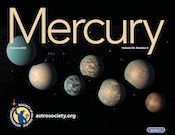Fall 2021 - Volume 50 No. 4

Table of Contents:
[16] Space News
A rundown of some of the most exciting developments in space and time.
[22] The History and Future of Exoplanet Science
In 30 years, scientists have discovered thousands of worlds outside our Solar System — some like our home system and most unlike it. What can these extrasolar planets reveal to astronomers?
[29] The Significance of Precision Cosmology
In the past several decades, many areas of astronomy, and especially cosmology, have evolved into precise sciences.
Departments:
[3] Perspectives, Liz Kruesi
Looking Back, Looking Forward
[4] First Word, Linda Shore
Reaching for the Stars: A Tribute to Michael Bennett
[6] Annals of Astronomy, Clifford J. Cunningham
Discovery of the Sun’s Rotation
[8] Armchair Astrophysics, Christopher Wanjek
The James Webb Space Telescope’s Nearly 50-Year History
[10] Education Matters, Brian Kruse
Earth is Home, Home is Earth
[12] A Little Learning, Scott T. Miller and C. Renée James
Group Theory
[37] Reflections, Liz Kruesi
Martian Vista
************
The History and Future of Exoplanet Science (Feature)
By Sarah Wells
Extrasolar planets, or more commonly “exoplanets,” spin around alien stars from as close as 4 light years away from Earth. Thirty years ago, the existence of these worlds — let alone the study of them — was an uncertainty. Today, exoplanet science is one of astronomy’s fastest growing fields.
The Significance of Precision Cosmology (Feature)
By Martine Lokken and Renée Hložek
Modern cosmology is the search for figuring out what the Universe isn’t. The cosmos provides us with a puzzle of cosmic proportions, and each new piece of evidence requires the work of dedicated observational scientists and engineers to measure, analyze and process, and theoretical ones to interpret. Further, advances in computation have given us the power to simulate model universes to try and fit the puzzle pieces together. Where all of these inquiry methods meet is “precision cosmology.”
American Astronomy’s Priorities Guide Released (News Story)
By Liz Kruesi
Once per decade, professional astronomers in the United States release their recommendations for the highest-priority science themes and projects, and thus the direction they think the field should move toward. In early November, astronomers released this decade’s report, titled Pathways to Discovery in Astronomy and Astrophysics for the 2020s.
